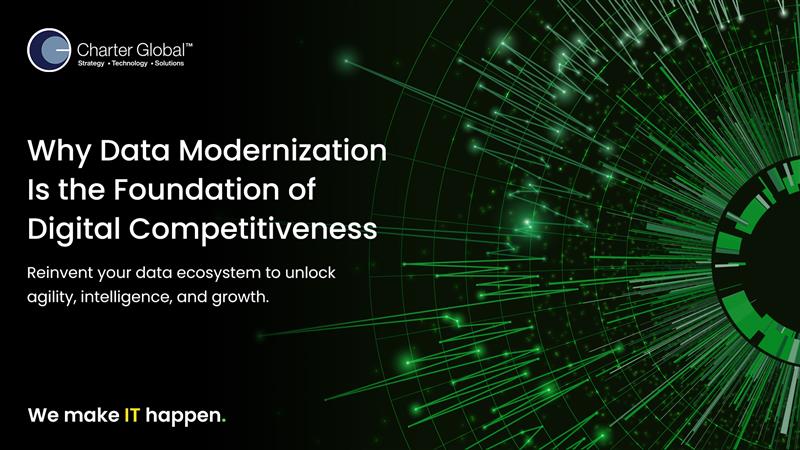Data is no longer just a byproduct of operations—it’s the driving force behind innovation, customer experience, and competitive advantage. IDC forecasts that the global datasphere will reach 175 zettabytes (ZB) by 2025. Yet for many organizations, a significant portion of that data remains siloed, unstructured, or trapped in legacy systems that weren’t designed for the demands of today’s real-time, AI-driven landscape. This creates a modern business paradox: companies are flooded with data but starved for insights.
At Charter Global, we work closely with enterprise clients to break down these barriers. Data modernization is not just a technology upgrade—it’s a strategic transformation that enables companies to harness data for faster decisions, deeper intelligence, and scalable innovation.

Modernization starts by rethinking the foundation. Outdated systems often can’t support cloud-native applications, real-time analytics, or enterprise AI. Our team helps businesses transition from rigid, high-maintenance infrastructures to modern, flexible environments optimized for performance, security, and growth.
Whether you’re leveraging Microsoft Azure’s robust AI and data services, building machine learning pipelines on AWS with SageMaker and Redshift, or tapping into open-source tools like Apache Spark, Kafka, or dbt (data build tool), the principles of modern data architecture remain the same: centralization, scalability, security, and insight.
A modernized data environment enables:
Organizations today are adopting multi-cloud and hybrid-cloud strategies to optimize workloads. While many enterprises rely on Azure for its seamless integration with Microsoft 365 and AI services like Copilot and Azure Synapse, AWS remains a leader in elasticity and scale for data-intensive applications. Meanwhile, open-source platforms like Kubernetes, Airflow, and Presto offer vendor-neutral options that accelerate deployment and lower long-term costs.
Every modernization effort should include five core architectural pillars:
That said, modernization isn’t without its challenges. Resistance to change, lack of in-house expertise, and fears around data migration can stall progress. This is where an experienced transformation partner like Charter Global adds value—from roadmap development to full implementation across any cloud or open-source stack.
For companies used to operating on legacy mainframes or fragmented systems, the transition can be daunting. But the cost of inaction is higher: slower decisions, missed opportunities, and an inability to meet modern customer expectations.
Data modernization isn’t an IT initiative—it’s a business necessity.
Start by identifying one process or platform that no longer supports your growth goals. Charter Global can help you modernize your data strategy—whether you’re exploring Microsoft Azure, AWS, or open-source alternatives.
Schedule a consultation today. Email us at sales@charterglobal.com or call 770-326-9933.